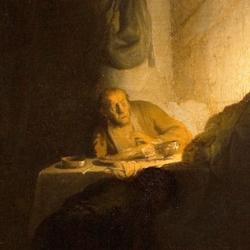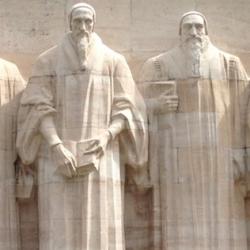The Eucharist is a feast of faith; it is a love feast. It also embodies the third theological virtue. Hope is inherent to the Eucharist.
In Luke’s account of the Last Supper, Jesus calls attention to the future reality of which the Supper is a sign.
He expresses his desire to eat the Passover with the disciples before His suffering, saying that it is the last time he will eat it until “it is fulfilled in the kingdom of God” (Luke 22:15-16). Before the end of Luke’s Gospel, Jesus is eating again with the disciples. By His resurrection, He has entered the kingdom and He eats in the kingdom.
The cup is also a link to the future: “I will not drink of the fruit of the vine from now on until the kingdom of God comes” (22:18). This is a kind of Nazirite vow; as Jesus enters the mortal combat of the cross, He renounces the fruit of the vine, liquid Sabbath, until the kingdom comes. We know from the other Gospels that the vow is fulfilled, in some respects, on the cross, as Jesus takes sour wine before announcing that it is finished.
The table fellowship in the Upper Room is a festival of hope, hope that the disciples will someday again share a table with Jesus, that they will enter fully into His Sabbath rest to drink wine in the presence of God.
The future is not just a future about Jesus – Jesus coming into the kingdom, Jesus drinking the wine of the kingdom. The meal is electric with anticipation for the disciples too, that they will be with Jesus, not only to commune with Him but to rule with Him.
Paul too recognized that the Eucharist pointed beyond itself into the future. “Whenever you eat and drink,” he said, “you proclaim the Lord’s death until He comes” (1 Corinthians 11:26).
How does the Eucharist proclaim the death of Jesus? It would seem that the Old Covenant sacrificial rites, with their knives, blood, and fire, would be a better representation.
In the context, I think Paul is highlighting something else. He’s not saying that the Lord’s Supper is a visual icon or depiction of the death of Jesus. He’s saying that the Supper proclaims the death of Christ, the death that demolished the dividing wall between Jew and Gentile and formed one new man from the old humanity. At the table, we are the product of the death of Jesus, testimony to the effect of His death.
Patristic writers were fully justified in thinking of the Lord’s Supper as a foretaste of the feast of the kingdom, a share now in the marriage supper of the Lamb of the age to come. It is a festival of hope.











